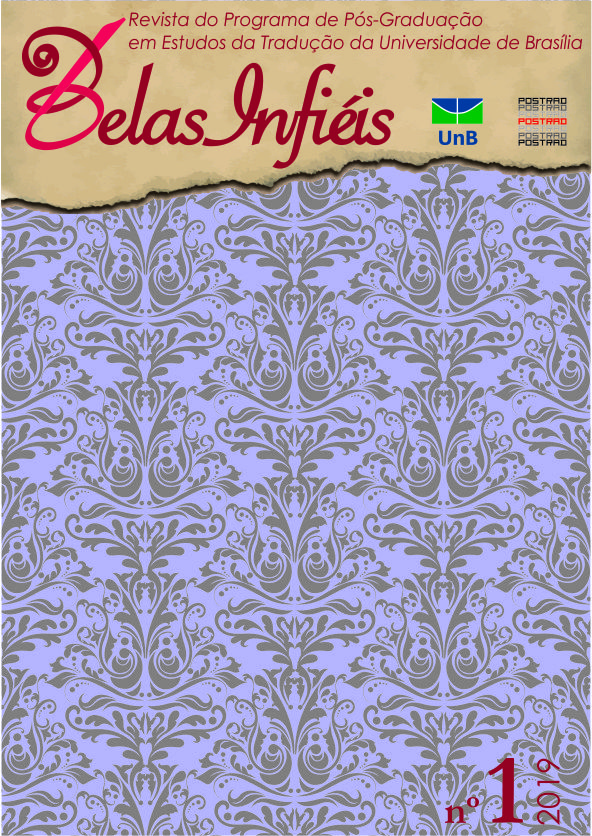A Profissionalização de tradutores/intérpretes de língua de sinais na cidade de Pelotas/RS:
um percurso narrado
DOI:
https://doi.org/10.26512/belasinfieis.v8.n1.2019.12821Palabras clave:
Língua Brasileira de Sinais, Tradutor/Intérprete, ProfissionalizaçãoResumen
Neste artigo, são retomados alguns processos implicados na profissionalização dos tradutores/intérpretes de língua de sinais no extremo sul do país por meio de documentos históricos e, também, da narrativa de uma das primeiras profissionais de Libras a atuar na cidade de Pelotas/RS. A base empírica compreende documentos e normativas que orientam a profissão, dados oriundos de outros estudos acadêmicos e, ainda, transcrições de entrevista realizada com uma das primeiras tradutoras/intérpretes da região. Os resultados deste estudo permitem entender que os tradutores/intérpretes de língua de sinais foram gradativamente conquistando espaços e circunscrevendo um campo específico de atuação, conjuntamente negociado. Observa-se, nos documentos e normativas que orientam a atuação desses profissionais, um investimento na produção de um perfil com propósitos distintos em cada tempo e contexto histórico, e vislumbra-se uma mudança de ênfase: se antes tais documentos orientavam-se fortemente para a regulação da conduta do profissional, na atualidade, voltam-se para competências tradutórias e para o cumprimento de regras já consolidadas sobre a profissão. Os depoimentos orais de uma profissional com larga experiência possibilitaram recuperar alguns aspectos sobre a história da profissionalização dos tradutores/intérpretes na cidade de Pelotas/RS e permitiram entender como se estabeleceram os processos de avaliação e validação do trabalho destes profissionais, num tempo em que não havia, ainda, normativas específicas. Destaca-se, ainda, o caráter político da atuação dos tradutores/intérpretes de língua de sinais na articulação à s lutas empreendidas pelas comunidades surdas pelo reconhecimento, valorização e ampliação dos espaços de visibilidade da Língua Brasileira de Sinais no estado do Rio Grande do Sul.
Descargas
Descargas
Publicado
Cómo citar
Número
Sección
Licencia
Copyright Statement
Given the public access to this journal, the texts are free to use but requires the recognition of the original authorship and initial publication in this journal to be properly stated.
The journal allows the use of works published for non-commercial purposes, including the right to submit the work to publicly accessible databases. Published contributions are the sole and exclusive responsibility of the author(s).
- When submitting papers to be evaluated by the Belas Infiéis journal, the author(s):
- Declare that the contents of the contributions are original and of their original creation, being entirely responsible for their content if there is an objection by third parties.
- Claim to be aware that they should not commit academic plagiarism.
- Declare that the manuscript has not been published, completely or partially, in Portuguese or another language. If it is a translation it should be submitted to the Translated Articles section.
- Declare that the manuscript is not being evaluated by other journals.
- Declare that the manuscript was not submitted to another journal simultaneously.
- Commit(s) to inform the journal of any kind of error or inaccuracy in their contribution (published, in evaluation or in editing) and to collaborate with the editors to make due corrections of the article (when in evaluation or editing) or erratum/retraction (after publication).
- Declare that there is no conflict of interest regarding the published work.
- Authorize its release if it is accepted for publication without any kind of monetary compensation.
- Agree to assign non-exclusive rights to publication to the magazine, remaining free to make their contribution available in other media as long as the publication of the first version in Belas Infiéis magazine is mentioned. They also authorize Belas Infiéis to assign their texts for reproduction in content indexers, virtual libraries and similar platforms.
- Maintain copyright and grant the journal the right of first publication, the work being licensed under theCreative Commons Attribution License.
- Is/Are allowed and encouraged to publish and distribute their work online after the editorial process, which may increase the impact and citation of the published work.
- Authorize the editorial team to make textual adjustments and to adapt the article to the publication rules, when necessary.



















